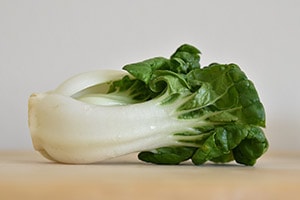 Bok choy is a member of the Brassicaceae/Cruciferae botanical family, which also contains cabbage, kale, Brussels sprouts, collard greens, and numerous other vegetables.
Bok choy is a member of the Brassicaceae/Cruciferae botanical family, which also contains cabbage, kale, Brussels sprouts, collard greens, and numerous other vegetables.
Bok choy is also known as pak choi.
Bok choy can be found in the mature, large form or as smaller baby bok choy. The large bok choy has white stems and dark-green leaves while the baby bok choy is smaller and light green.
Shanghai bok choy is another variety that has a pale yellow green stock and light green leaves.
Purchasing, Selecting, Storing, and Preparing
- Purchase bok choy fresh from the farmer’s market when in season.
- Bok choy is available year round at grocery stores.
- Look for bok choy with bright green leaves and crisp stalks. Avoid bok choy with wilted leaves, or leaves that are yellowish and discolored.
- Store bok choy in a mesh bag in the refrigerator. Plastic bags tend to encourage moisture, resulting in decay of the vegetable.
- Bok choy will keep fresh for 3-5 days in the refrigerator.
- To prepare bok choy, rinse thoroughly to remove any hidden dirt between leaves and stalks.
- The stalks of bok choy take longer to cook. Separate stalks from leaves and begin to cook stalks first, adding leaves later.
- Sauté, blanch, steam or grill bok choy.
- Add to stir-fry, soups, stews, curries, or slice thinly to add to salads.
Nutrition Information
Bok choy is an excellent source of vitamin A, vitamin C, and vitamin K.
- Vitamin A aids in growth and development, immune function, reproduction, and vision health.
- Vitamin C is an antioxidant that fights against free radicals to reduce the risk of chronic diseases such as heart disease and certain types of cancer. Vitamin C also supports wound healing and immune function.
- Vitamin K assists in blood clotting and bone health.
The Brassicaceae botanical family also contains substances that may protect against cancer when included regularly in a balanced diet.
Nutrition Facts
Bok choy, ½ cup cooked
- Calories: 2
- Protein:3 g
- Fat:14 g
- Carbohydrate:5 g
- Fiber:9 g
- Calcium: 79 mg
- Iron:89 mg
- Magnesium:4 mg
- Phosphorus:7 mg
- Folate:9 µg
- Vitamin A: 180 µg
Via fdc.nal.usda.gov
Recipes
Request an Appointment
